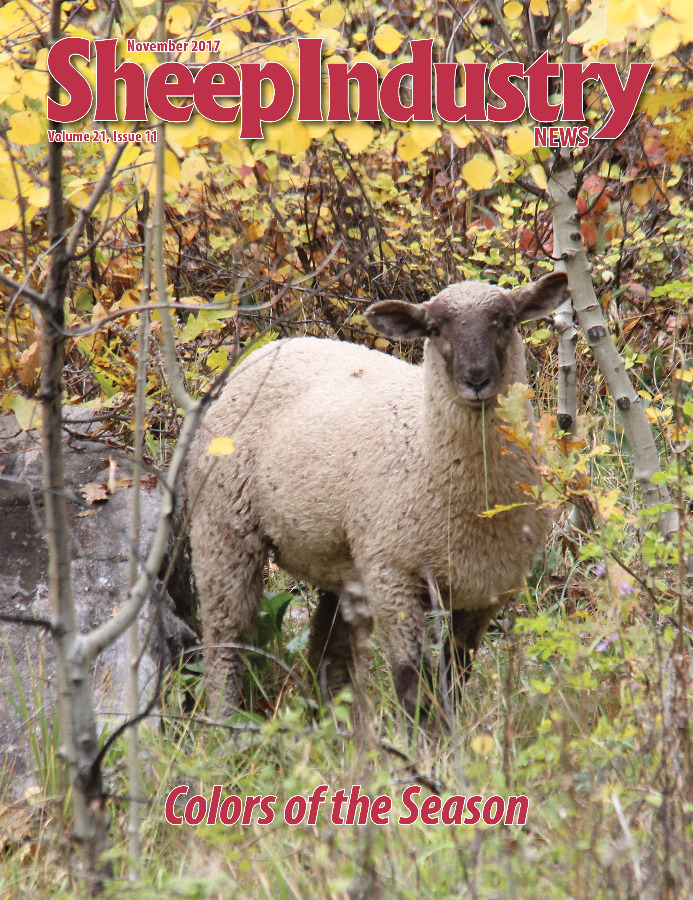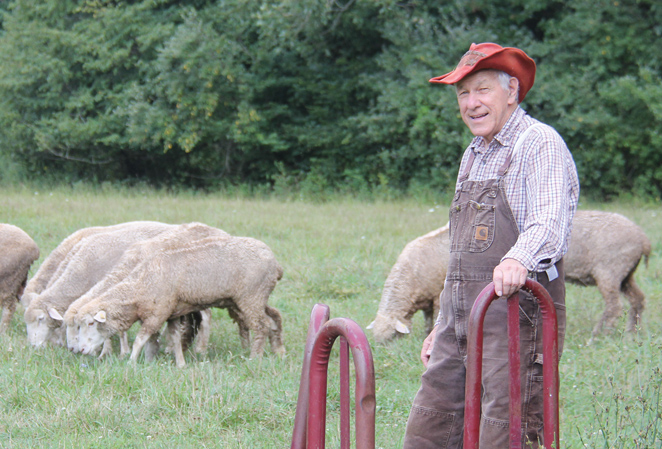
- November 2017
- President’s Notes
- NSIP, Breeds Find Common Goals
- NSIP Adds Searchable Database
- Sheep Prove More Reliable than Weather in Bayfield
- Cestari Hoping to Rebuild Wool Sheep Numbers Back East
- Tips for Culling & Selecting Ewes
- Young Entrepreneur: Katie Forrest
- Obituaries
- Around the States
- Market Report
- The Last Word
Cestari Hoping to Rebuild Wool Sheep Numbers Back East
Less than a mile from where Francis Chester’s sheep graze outside his living room window lays the foundation of his latest dream. The new mill – scheduled for completion in 2018 – will be a showplace compared to the quaint old barn that Cestari Sheep and Wool Company currently occupies in nearby Churchville, Va.
 But even as Chester debates the merits of expensive finishes that will create the mill in a grand fashion harkening back to wool’s heydays in the early 1900s, he wonders if he’ll have enough raw wool to make it all worthwhile.
But even as Chester debates the merits of expensive finishes that will create the mill in a grand fashion harkening back to wool’s heydays in the early 1900s, he wonders if he’ll have enough raw wool to make it all worthwhile.
Fortunately, Chester believes in facing challenges head on, which is why he’s created the Cestari Let’s Grow Sheep Together Program.
“I’m looking for a way where I can have more control over quality and supply,” he admits. “But at the same time, I want to see an increase in wool sheep back east. The whole northeast and the midwest are great places to raise wool sheep. I’m in Virginia and I think it’s a great place to raise wool sheep. So many people in this area are going to hair sheep, which has cut into my wool supply. I raise sheep, but I’ve had to start buying more and more wool from out west to supplement what I need for the mill.”
Recent changes to his breeding program have significantly reduced Chester’s own sheep flock to around 100 head. That’s a fifth of what he had at one time, making it easy to see that he needs help to meet the mill’s demands for quality wool.
That’s where the new program comes into play. Chester will help producers get started in his program by providing Columbia and Targhee (or crosses of the two) ewes and rams for a reasonable price.
“When I cross the Columbias and the Targhees, they come out beautiful,” Chester says. “I just love their wool. But I need more of it.”
He’ll also help producers address the biggest concern of many sheep producers: shearing.
“We’re going to setup shearing stations, where they can bring their sheep and have them sheared at a reasonable price. By bringing several flocks into a central location, I think I can get that shearing price down compared to what most people back east are paying. I’ll buy the wool for $3 a pound, which is a great price. But I need good wool. It’s got to be clean wool, 23 microns or less. Anything over that and I’m getting a coarseness that isn’t acceptable in my market.”
Producers will pay a small fee on top of shearing to cover the costs of hosting such an operation. Chester has already had conversations with producers in Wisconsin and Michigan about hosting shearing days for a handful of flocks. He’ll also host a central shearing station at his home in Virginia.
“I’ll even give producers a station and they can shear their own sheep and save the cost of the shearer,” Chester adds. “But I want the sheep sheared at these central locations, and I have a reason for that. The wool is going to be sheared, skirted, classed and baled all that station so that we can manage the quality.”
In the short term, Chester’s plan probably isn’t cheaper than just buying wool from western producers.
“I’m trying to create a stable market,” he says. “When I go to buy wool right now, I never know just what I’m going to get. I need a steady market and a steady product, and this plan can help me establish that while helping people get started in the wool sheep business. I want to develop a relationship with producers who are interested in producing the quality wool that I need.”
Chester changed his own breeding program to add strength, loft and softness to his end product, which is mostly yarn.
“It’s been well worth the transition,” he says. “Now, we just have to keep building.”
Beyond his program for sheep producers, Chester has other plans in the works for 2018. Among those is a series of three-day seminars for knitters, crocheters and hand spinners that will bring them to nearby Staunton, Va., for an in-depth look at the wool industry and the crafts they practice. Lessons in their chosen crafts will take place at the mill, while the seminars will also leave time to experience the history and culture of the area.
“We’ve got a lot going on here,” says Chester, who seems to thrive on big ideas and working to achieve them.
To learn more, visit CestariSheep.com.

